
by Debi Blaney, NOAA Office of Ocean Exploration and Research
July 12, 2017
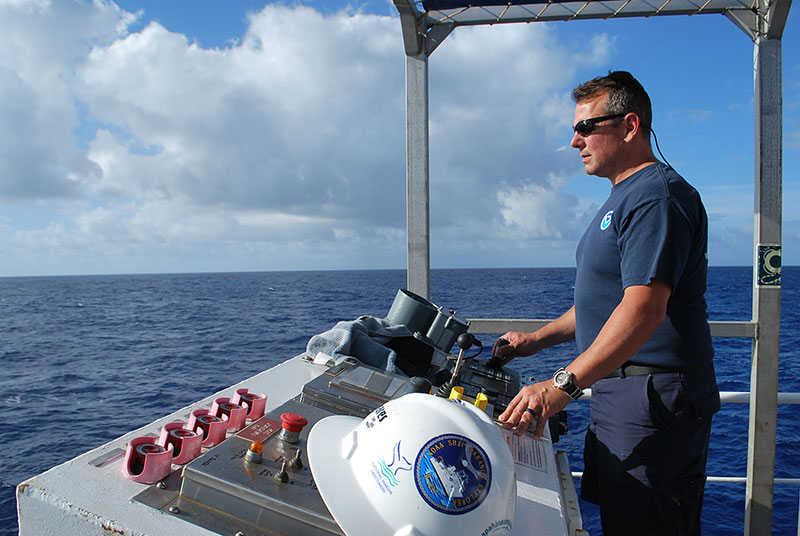
CDR Eric Johnson oversees deployment of the CTD rosette during a shakedown cruise on NOAA Ship Okeanos Explorer. Image courtesy of the NOAA Office of Ocean Exploration and Research, 2017 Laulima O Ka Moana. Download larger version (jpg, 1.3 MB).
Eric Johnson is the brand new Commanding Officer of NOAA Ship Okeanos Explorer and just embarked on his first expedition as her Captain, heading to the Johnston Atoll Unit of the Pacific Remote Islands Marine National Monument, now known as Pacific Islands Heritage Marine National Monument. Commandeering a ship of this size and ensuring successful exploration of the deep sea is no small task! I had the honor of meeting Eric in person before he set sail and got to ask him about his journey to becoming the ship’s captain and what it takes to successfully command a NOAA vessel.
Q: What sort of assignments have you had in the NOAA Corps?
A: I started as an Ensign after Basic Training on NOAA Ship Oregon II doing fisheries research. On my first land assignment, I was the Executive Officer for the NOAA Dive Program, training divers in the water and the classroom. I then went to sea on NOAA Ship Hi‘ialakai as the Operations Office, acting as the liaison between the scientific party and the ship conducting upwards of 4,000 research dives a year. After a year as the Ops, I fleeted up to become the Executive Officer (XO) for the rest of my time there. Following that tour, I reported to Silver Spring, Maryland, as the NOAA Corps recruiting officer. My next assignment brought me back to the Oregon II as the XO this time. I reported to the Integrated Ocean Observation System (IOOS) for my next assignment, working in Silver Spring, followed by my current assignment here on the Okeanos Explorer as the Commanding Officer.
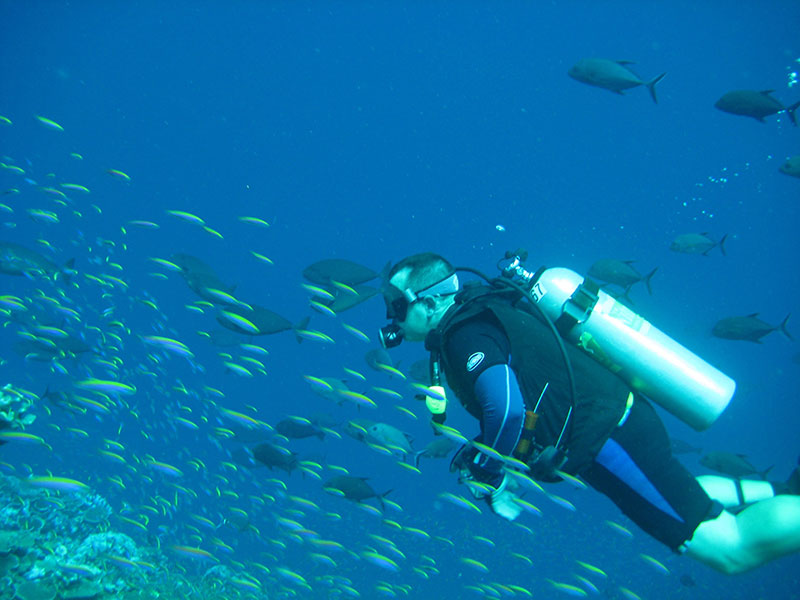
Eric Johnson diving at Jarvis Island in the equatorial Pacific when on the Hi‘ialakai. Image courtesy of CDR Eric Johnson. Download larger version (jpg, 2.2 MB).
Q: What do you think the biggest challenge of being a commanding officer (CO) will be?
A: Balancing the many personalities, mission needs, safety of the vessel and crew, and having the “big picture” to keep all safe and happy.
Q: How would you describe your leadership style or philosophy?
A: I try to relate directly with my crew and customers. I’m an extrovert and love recharging with people and I keep a positive outlook on things. You have to be flexible and ready to adapt and use creative problem solving at sea.
Q: What are some things about the Okeanos Explorer crew that the public doesn’t get to see or understand from watching the video feeds?
A: How hard the crew works behind the scenes to make the operations successful. From the engineers tweaking, repairing, and maintaining all the ship systems; stewards making excellent meals for up to 50 people three times a day; deckhands who run all the equipment for deployment, drive the small boats, preserve and maintain the material condition of the ship; to the officers and mates driving the ship, ordering supplies, running morale for all, and coordinating and keeping all personnel safe in a very challenging environment. It is a total team effort that makes me proud to be a part of.
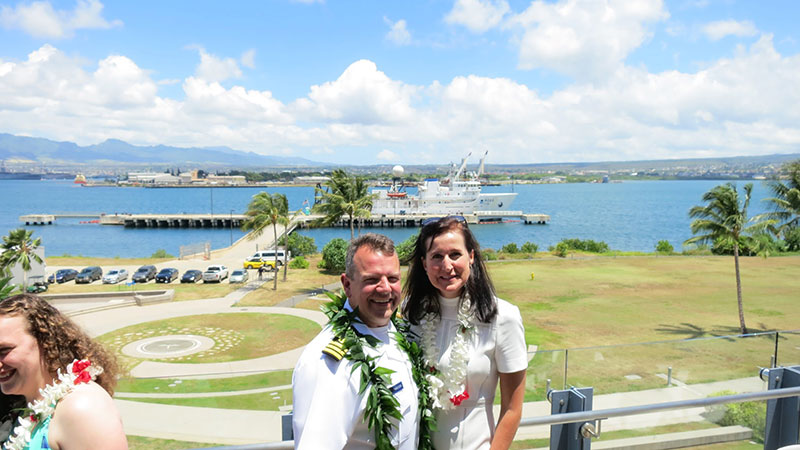
Eric Johnson with his wife, Angela, and NOAA Ship Okeanos Explorer in the background during the Change of Command in July 2017. Download larger version (jpg, 1.0 MB).
Q: What are the personal rewards of your work?
A: What I do out here makes a real difference in our understanding of the world around us and helps us make the world a better place for future generations. Through the work we do here, the nation and world see things they wouldn’t in the regular course of their lives.
Q: What sparked your initial interest in your work?
A: I’ve loved the water and wanted to work with the natural world all my life, and finding the NOAA Corps by accident was one of the most fortuitous events that helped get me where I am today.
Q: What obstacles did you encounter along the way?
A: I had some challenges in college, I was not the most applied student when I started. Then I took a break, but eventually went back and completed my degree. I’ve had many jobs but I know I’ve learned from all of them.
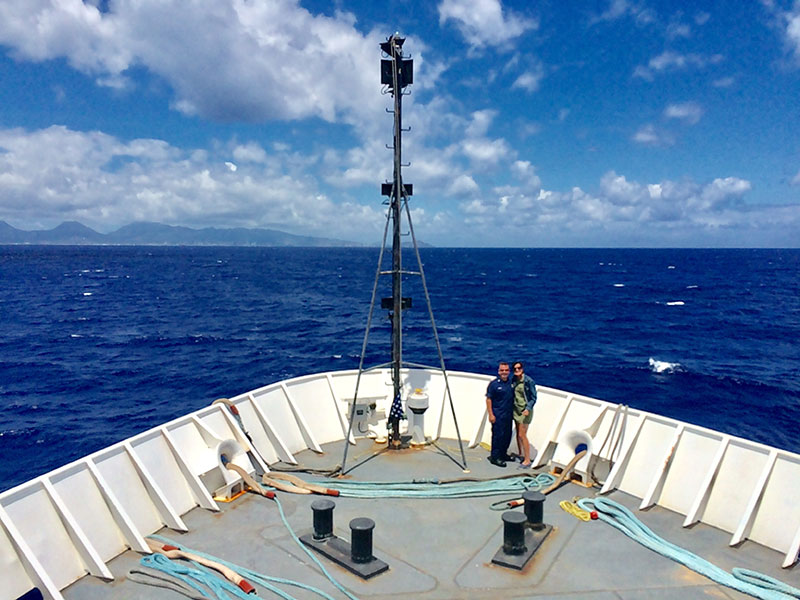
Eric Johnson with his wife on the bow of NOAA Ship Okeanos Explorer during the transit back to Pearl Harbor. Download larger version (jpg, 2.8 MB).
Q: What is one important lesson you have learned from spending long periods of time at sea?
A: To worry about things that you can control and to let go of frustrations related to those things you cannot. It allows you to focus on solutions rather than the emotions of a tough situation.
Q: What is your superpower while out at sea?
A: To make people laugh—it keeps spirits up during long working seasons.
Q: If you could be any sea creature, which would you be and why?
A: A shark, so beautiful in motion, but amazingly adapted to living and surviving in the sea.
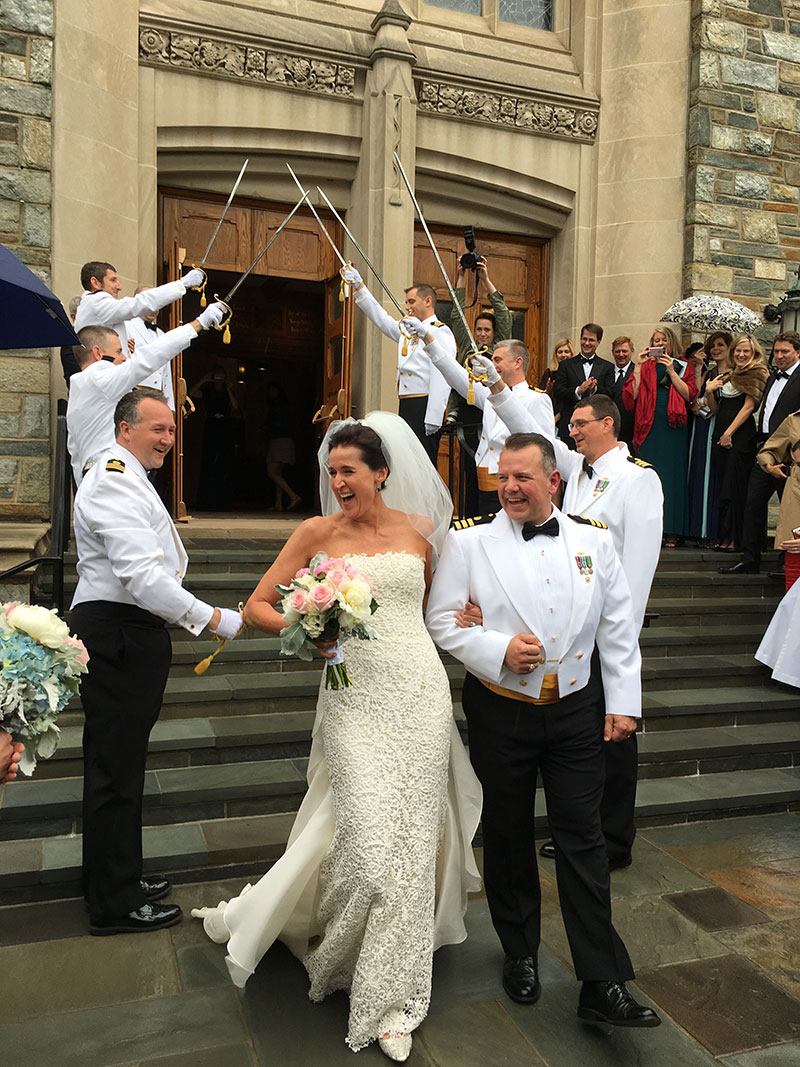
Eric Johnson with his wife, Angela, and NOAA Corps Officers during their recent wedding. Download larger version (jpg, 5.4 MB).